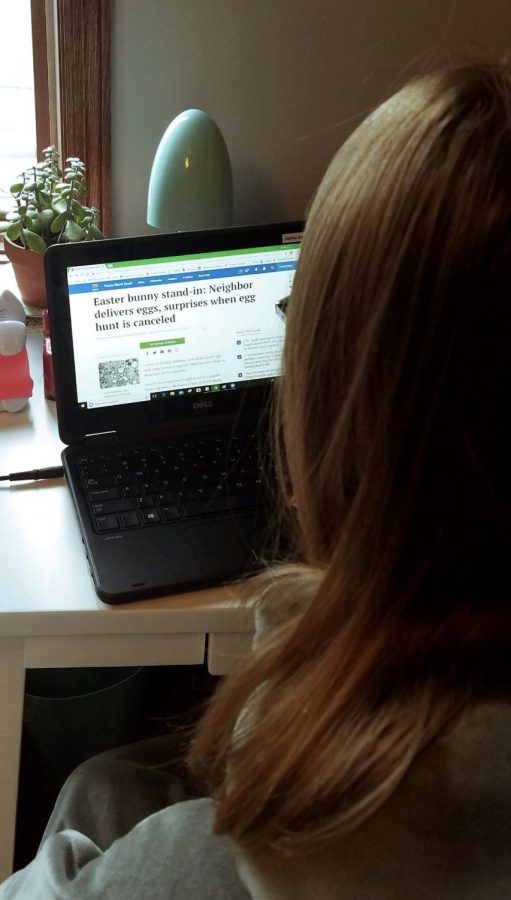Reporting from the front lines
Journalists deserve credit for their work during the pandemic
photo courtesy of Ashley Sudeta
Omaha World-Herald is providing free access to articles about COVID-19. Their local coverage continues to provide critical information and stories of hope to the community.
April 15, 2020
It’s 7 p.m. in New York City, and people flock to their windows with cowbells and whistles, hooting and cheering as healthcare workers, grocery store employees and emergency responders return from their shifts.
The applause is highly deserved. Amid the coronavirus pandemic, front-line workers are putting their lives at risk to protect the rest of the world and keep society moving. However, there is one group of front-line workers who have gone largely unacknowledged in the global conversation: journalists.
Pictures of healthcare workers with indents on their faces from wearing masks all day, cashiers behind glass panels and educators trying to teach lessons from home circulate around social media. They are powerful images, but who is capturing these photos? Who is telling these stories?
Journalists work hard year-round to deliver critical information and tell stories. Now, they are working harder than ever to keep the scared and confused public informed. Whether it’s in-depth features, morning news podcasts, investigative reports or breaking news, the media is critical in this fight. They deserve credit and support for their work.
When the testing system in the US was failing and giving out faulty tests, journalists were there to uncover the truth and hold the government accountable. As data emerged on racial disparities in COVID-19 deaths, journalists were there reporting and making sense of it. When Amazon employees began striking in protest of the lack of safety measures in warehouses, journalists were there taking pictures and interviewing workers. When healthcare workers were reporting a lack of protective equipment and resources in hospitals, journalists were there to expose the truth and pressure the government to do more to support hospitals.
The voices of people who would otherwise go unheard and the truths that would go untold are all being brought to light because they have chosen to keep digging deeper and asking the difficult question. Through ventilator shortages, clinical trial cancellations and commercial exploitation of medical necessities, they have been working relentlessly to piece together one of the biggest news stories in modern history.
Journalists have long faced censorship, criticism and violence because of their work. Women, in particular, suffer harassment when reporting. Over 70% of female journalists from the US and Canada surveyed by the Committee to Protect Journalists in 2019 said they had experienced some form of threats or safety violations. Threats to journalists everywhere reached a historic high in 2018 as reported by The Guardian.
The pandemic has only made these problems worse. In Wuhan, China, some of the journalists who initially reported on COVID-19 have gone missing, as reported by BBC and The New York Times. In Venezuela and Turkey, among other countries, journalists have been detained for their reporting on COVID-19 according to the Columbia Journalism Review. Countries including Egypt and Iran have suppressed media coverage and pressured reporters to downplay case numbers.
In April of 2020, President Donald Trump tweeted that the press is “truly the enemy of the people.” Despite the narrative crafted by politicians and those in power, most journalists are not corrupt, power-hungry people who want to spread lies for their own agenda. Now more than ever, the press is the only thing keeping the people informed, holding leaders accountable and providing hope through the stories they tell.
Journalists are not immune to the financial or mental impacts of COVID-19. Yet, during this pandemic, reporters have still been some of the first ones to show up, chasing the story and digging for the truth despite their own fears. They are showing up for their communities and society, and now society needs to show up for them.
The DART Center for Journalism and Trauma reported that over 90% of journalists have experienced four or more traumatic events related to their work, and they are at a higher risk for developing Post Traumatic Stress Disorder according to a 2012 study from the International Journal of Social Psychiatry. As reported by The Guardian, journalists are now covering an emotionally intense topic that affects everyone, including them, directly. They are reporting on death, sickness and loss. They are interviewing people who are telling them that this is only going to get worse and reading the harrowing data of projected death tolls. Unlike most people, they don’t have the option to tune out of the news when it becomes too much. Considering that this crisis is likely to continue for months, as reported by The Atlantic, reporters will need extensive support to prevent long-term mental health issues or burnout.
Some journalists are working harder than ever, while others, such as sports broadcasters, are completely out of work. Independent journalists and local papers have also been suffering greatly. With local newsrooms already shrinking, the loss of revenue from non-essential business closures has been devastating. Right now, local journalism is one of the only sources for people to learn about the impact of COVID-19 on their community, the number of cases, city or state-wide measures that have been put in place or information on where to get testing. They need support just as much as small businesses during this time.
During unprecedented times like these, journalists serve as far more than reporters. They are lie-detectors, history-recorders and story-tellers. They share accounts of hope to keep people going and tales of corruption to keep people informed. They serve as the voice of the people in press conferences and the eyes of their communities on the scene. Without the photos, videos and stories from journalists, this pandemic might not seem as real or urgent as it is. Support and thank them for the work they’re doing. Journalism matters, now more than ever.








